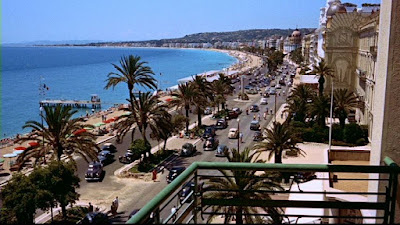Romance, adventure and intrigue, plus dashing Cary Grant and delectable Grace Kelly. All of this along with a tour of the glittering French Riviera courtesy of Alfred Hitchcock. Who could resist such high style fun in the sun - and moonlight?
What rapidly turns into an adventure begins with a mundane shot of a sedate travel agency where a colorful poster in its window proclaims, "If you love life, you'll love France." The scenario shifts quickly, plunging into the poster image of the Riviera and then, suddenly, to the face of a middle-aged woman who is screaming frantically as she discovers her jewels have been stolen. Running to the sea-view balcony of her hotel suite she cries out over the Promenade des Anglais, "Help, help, police!" It soon comes out that the Riviera has lately been plagued by a rash of robberies all having the earmarks of a legendary jewel thief, now retired, by the name of John Robie (Cary Grant), once known as "the Cat."
























